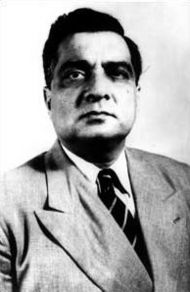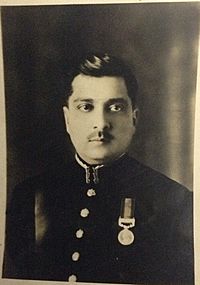Iskander Mirza facts for kids
Quick facts for kids
Iskandar Ali Mirza
|
|
|---|---|
| ইস্কান্দার আলী মির্জা اسکندر علی مرزا |
|

Mirza in 1956
|
|
| 1st President of Pakistan | |
| In office 23 March 1956 – 27 October 1958 |
|
| Preceded by | Position established |
| Succeeded by | Muhammad Ayub Khan |
| 4th Governor-General of Pakistan | |
| In office 7 August 1955 – 23 March 1956 |
|
| Monarch | Elizabeth II |
| Prime Minister | Mohammad Ali Bogra (1955) Muhammad Ali (1955–56) |
| Preceded by | Malik Ghulam Muhammad |
| Succeeded by | Position abolished |
| 4th Minister of Interior | |
| In office 24 October 1954 – 7 August 1955 |
|
| Prime Minister | Mohammad Ali Bogra |
| Preceded by | Mushtaq Ahmed Gurmani |
| Succeeded by | Fazlul Huq |
| Minister of States and Frontier Regions | |
| In office 24 October 1954 – 7 August 1955 |
|
| Prime Minister | Mohammad Ali Bogra |
| Governor of East-Bengal | |
| In office 29 May 1954 – 23 October 1954 |
|
| Governor General | Sir Ghulam Muhammad |
| Chief Minister | Abu Hussain Sarkar |
| Preceded by | Chaudhry Khaliquzzaman |
| Succeeded by | Muhammad Shahabuddin (Acting) |
| Secretary of Defence | |
| In office 23 October 1947 – 6 May 1954 |
|
| Prime Minister | Liaquat Ali Khan (1947–51) K. Nazimuddin (1951–53) Mohammad Ali Bogra (1953–54) |
| Minister | Liaquat Ali Khan |
| Preceded by | State established |
| Succeeded by | Akhter Husain |
| Vice-President of the Republican Party | |
| In office 1955–1958 |
|
| President | Sir Feroze Khan |
| Minister of Defence Acting |
|
| In office 16 October 1951 – 17 October 1951 |
|
| Preceded by | L. A. Khan |
| Succeeded by | Khawaja Nazimuddin |
| Personal details | |
| Born |
Iskandar Ali Mirza
13 November 1899 Murshidabad, Bengal Presidency, British India (now, West Bengal, India) |
| Died | 13 November 1969 (aged 70) London, England |
| Cause of death | Cardiac arrest |
| Resting place | Imamzadeh Abdullah, Tehran, Iran |
| Citizenship | United Kingdom (1899–1947) (1958-1969) Pakistani (1947–1969) |
| Political party | Republican Party (1955–59) |
| Other political affiliations |
Muslim League (1950–55) |
| Spouses |
Rifaat Begum
(m. 1922–1953)Nahid Mirza
(m. 1954–1969) |
| Children | 6 |
| Relatives | Nawabs of Bengal (paternal) Tyabji family (maternal) |
| Residences | Dhaka, East Bengal London, England |
| Alma mater | Royal Military College Bombay University |
| Civilian awards | |
| Military service | |
| Branch/service | |
| Years of service | 1920–1954 |
| Rank | |
| Unit | Corps of Military Police |
| Commands | Corps of Military Police East Pakistan Rifles |
| Battles/wars | Waziristan War Indo-Pakistani War of 1947 |
| Military awards | |
Iskandar Ali Mirza (13 November 1899 – 13 November 1969) was a Bengali-Pakistani politician, statesman and military general who served as the Dominion of Pakistan's fourth governor-general of Pakistan from 1955 to 1956, and then as the Islamic Republic of Pakistan's first president of Pakistan from 1956 to 1958.
Contents
Early life

Iskandar Ali Mirza was born in Murshidabad, Bengal, in India on 13 November 1899, into an elite and wealthy aristocrat family. Mirza was the eldest child of Nawab Fateh Ali Mirza and Dilshad Begum (1875–1925). His family had close ties to the British monarchy.
Mirza was educated at the University of Bombay before attending the Royal Military College, Sandhurst.
Career
After a military service in the British Indian Army, he joined the Indian Political Service and spent the most of his career as a political agent in the Western region of British India until elevated as joint secretary at the Ministry of Defence in 1946. After the independence of Pakistan as a result of the Partition of India, Mirza was appointed as the first Defence Secretary by prime minister Liaquat Ali Khan, only to oversee the military efforts in the first war with India in 1947, followed by the failed secession in Balochistan in 1948. In 1954, he was appointed as the Governor of his home province of East Bengal by Prime Minister Mohammad Ali of Bogra to control the law and order situation sparked by the popular language movement in 1952, but was later elevated as Interior Minister in the Bogra administration in 1955.
Playing a crucial role in the ousting of Governor-General Sir Malik Ghulam, Mirza assumed his position in 1955 and was elected as the first President of Pakistan when the first set of Constitution was promulgated in 1956. His presidency, however, was marked with political instability which saw his unconstitutional interferences in the civilian administration that led to the dismissal of four prime ministers in a mere two years. Facing challenges in getting the political endorsements and reelection for the presidency, Mirza surprisingly suspended the writ of the Constitution by imposing martial law against his own party's administration governed by Prime Minister Feroze Khan on 8 October 1958, enforcing it through his army commander General Ayub Khan who dismissed him when the situation between them escalated, also in 1958. Mirza lived in the United Kingdom for the remainder of his life. He died of a heart attack on 13 November 1969, his 70th birthday and was buried in Iran in 1969.
His legacy and image is viewed negatively by some Pakistani historians who believe that Mirza was responsible for weakening democracy and causing political instability in the country.
Family
Mirza was married twice: his first marriage took place on 24 November 1922, when he married an Iranian woman, Rifaat Begum (1907–23 March 1967). The couple had two sons and four daughters.
In October 1954, while in West Pakistan, Mirza's second marriage took place in Karachi after he fell in love with an Iranian aristocrat, Naheed Amirteymour (1919-2019), daughter of Amirteymour Kalali.
Honours
- India General Service Medal (1909)
- King George V Silver Jubilee Medal – 1935
- King George VI Coronation Medal – 1937
- Officer of the Order of the British Empire (OBE) – 1939
- Companion of the Order of the Indian Empire (CIE) – 1945
- Pakistan Independence Medal – 1948
- Queen Elizabeth II Coronation Medal – 1953
- Grand Collar of the Order of Pahlavi of the Empire of Iran – 1956
- Order of the Supreme Sun, 1st Class of the Kingdom of Afghanistan – 1958
Images for kids
-
Iskander Mirza's State Funeral in Tehran's Sepahsalar Mosque, Iran.
See also
 In Spanish: Iskander Mirza para niños
In Spanish: Iskander Mirza para niños


